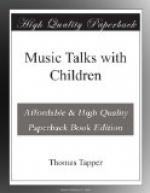Sometimes, when I am in a great gallery, the thought is very strong in me, that many (ever, and ever so many) people, in all countries and in all times, have so loved the beautiful as to devote their lives to it. Painters, who have made pictures to delight men for generations, looked and looked and prayed to find the beautiful. And we must believe that one looks out of the heart to find the beautiful or he finds only the common. And the sculptors who have loved marble for the delight they have in beautiful forms, they, too, with eyes seeking beauty, and hands so gentle upon the marble that it almost breathes for them, they, too, have loved the beautiful.
But commoner ones have the tenderest love for what is sweet and fair in life,—people who are neither painters nor sculptors. In their little way—but it is a true way—they have sunlight in their hearts, and with it love for something.
Perhaps it is a flower. I have been told of a man—in fact I have seen him—who could do the cruelest things; who was so bad that he could not be permitted to go free among others, and yet he loved plants so much that if they were put near him he would move quietly among them, touching this one and that; gazing at them, and acting as if he were in another world. As we said once before about the spring, so we may say here about love for the beautiful: it may be covered up with every thing that is able to keep it down, but it is always there.
It is always pleasanter to hear about people and their ways than to heed advice. But people and their ways often set us good examples; and we were curious, indeed, if we did not look sharply at ourselves to see just what we are. From all we have been told about the beautiful we can at least learn this: that it sweetens life; that it makes even a common life bright; that if we have it in us it may be as golden sunlight to some poor one who is in the darkness of ignorance, that is the advantage and the beauty of all good things in our lives, namely, the good it may be unto others. And the beautiful music we may sing or play is not to show what we are or what we can do—it will, of course do these things—but it is to be a blessing to those who listen. And how are blessings bestowed? Out of the heart.
Once there was a nobleman[66] with power and riches. He loved everything. Learning and art and all had he partaken of. But the times were troubled in his country, and for some reason he lost all he had and was imprisoned. Then there was scarcely anything in his life. All he had was the cell, the prison-yard, and, now and again, a word or two with his keeper. The cell was small and gloomy, the keeper silent, the yard confined and so closely paved with cobblestones that one could scarcely see the earth between them.
Yes, indeed, it was a small world and a barren one into which they had forced him. But he had his thoughts, and daily as he walked in his confined yard, they were busy with the past, weaving, weaving. What patterns they made, and he, poor one, was sometimes afraid of them! But still they kept on weaving, weaving.




